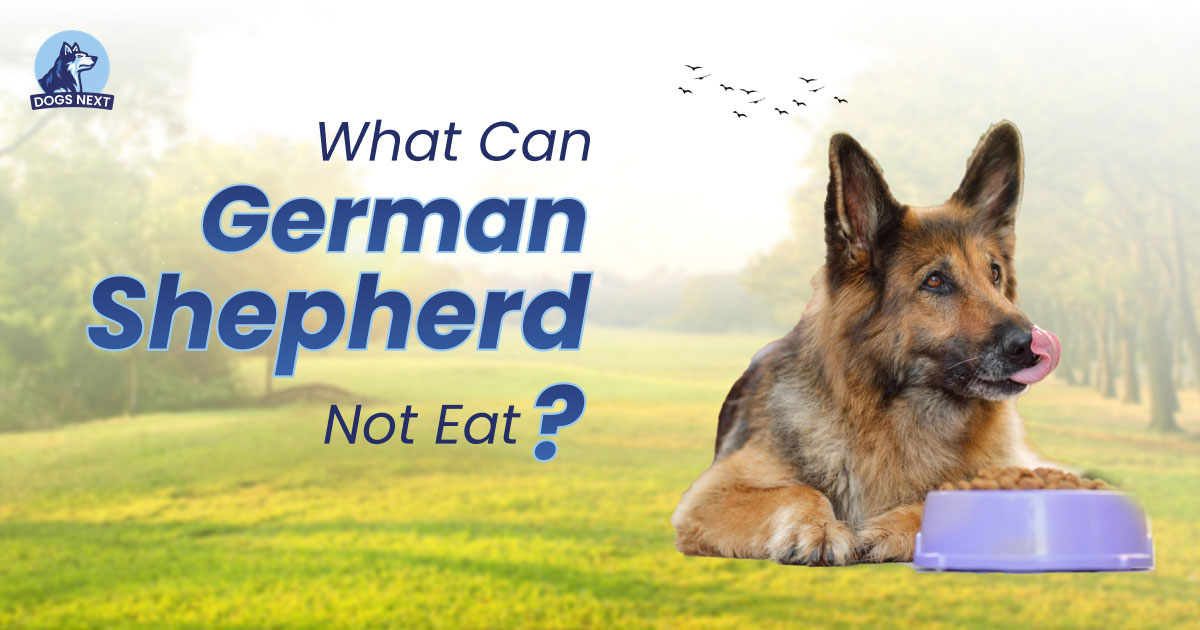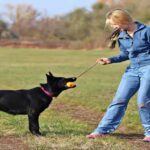German Shepherds should not eat chocolate, grapes, onions, garlic, or foods with high salt content. These can be toxic to them.
German Shepherds are loyal, intelligent, and active dogs that require a balanced diet to maintain their health. Certain foods are harmful and can cause severe health issues. Chocolate contains theobromine, which is toxic to dogs. Grapes and raisins can lead to kidney failure.
Onions and garlic contain compounds that can damage red blood cells. Foods high in salt can result in excessive thirst and urination, potentially leading to sodium ion poisoning. Always ensure your German Shepherd’s diet is safe and nutritious to keep them happy and healthy. Proper nutrition is vital for their well-being and longevity.
Importance Of A Balanced Diet For Canine Health
German Shepherds are intelligent, loyal, and energetic dogs. They need a balanced diet to stay healthy and active. Knowing what foods are harmful ensures they live a long, happy life. Let’s dive into the importance of a balanced diet for canine health.
A balanced diet is crucial for your German Shepherd’s health. It provides essential nutrients, vitamins, and minerals. These elements help maintain their energy levels, coat health, and overall well-being.
Proteins are vital for muscle development and repair. Carbohydrates provide the energy they need for their active lifestyle. Fats support brain health and a shiny coat. Vitamins and minerals are essential for immune function and bone health.
Feeding your dog a balanced diet prevents obesity, diabetes, and other health issues. It strengthens their immune system, keeping them free from infections. A healthy diet also improves their mood and behavior.
Foods To Avoid For German Shepherds
Some foods are toxic to German Shepherds. Avoid these to ensure their safety:
- Chocolate: Contains theobromine, harmful to dogs.
- Grapes and raisins: Can cause kidney failure.
- Onions and garlic: Damage red blood cells.
- Avocado: Contains persin, which is toxic to dogs.
- Alcohol: Affects their liver and brain.
Signs Of Food Toxicity In German Shepherds
Watch for these signs if your dog eats something toxic:
- Vomiting
- Diarrhea
- Lethargy
- Tremors
- Seizures
What To Do In Case Of Food Poisoning
If you suspect food poisoning, contact your vet immediately. They may induce vomiting or provide activated charcoal. Quick action can save your dog’s life.
Safe And Healthy Food Options
Feed your German Shepherd these healthy options:
| Food | Benefits |
| Chicken | Rich in protein |
| Carrots | Good for eyesight |
| Sweet Potatoes | High in fiber |
| Apples (no seeds) | Vitamin C |
Factors Influencing Dietary Needs
German Shepherds are known for their loyalty, intelligence, and strength. However, their dietary needs can be complex. Understanding what they should not eat is crucial to keep them healthy. Various factors influence their dietary needs, ensuring they get the right nutrition while avoiding harmful foods.
Health Conditions
Some German Shepherds have specific health conditions. These conditions require special diets. For example, dogs with diabetes need low-sugar foods. Those with kidney issues need low-protein diets. Health conditions greatly affect what foods are safe for your dog.
Age And Life Stage
Puppies, adults, and seniors have different dietary needs. Puppies need high-calorie, high-protein diets for growth. Adult dogs need balanced nutrition to maintain weight and health. Senior dogs need fewer calories but more fiber. Each life stage requires different foods to avoid.
Activity Level
Active German Shepherds need more calories and protein. Sedentary dogs need fewer calories to avoid obesity. High-energy dogs benefit from foods rich in protein and fats. Low-energy dogs need foods that are less calorie-dense.
Allergies And Sensitivities
Many German Shepherds have food allergies or sensitivities. Common allergens include beef, chicken, and grains. Dogs with allergies need hypoallergenic diets. It’s essential to identify and avoid these allergens.
Weight Management
Maintaining a healthy weight is crucial. Overweight dogs need low-calorie, high-fiber foods. Underweight dogs need calorie-dense, protein-rich foods. Proper weight management helps avoid other health issues.
Environmental Factors
Climate can influence dietary needs. Dogs in cold climates need more calories to maintain body heat. Dogs in hot climates need more water and electrolytes. Environmental factors should guide dietary choices.
| Factor | Influence on Diet |
| Health Conditions | Special diets for specific issues |
| Age and Life Stage | Different nutrition for puppies, adults, seniors |
| Activity Level | Calorie and protein needs vary |
| Allergies and Sensitivities | Need for hypoallergenic diets |
| Weight Management | Different diets for weight control |
| Environmental Factors | Diet changes with climate |
Foods Harmful To German Shepherds
German Shepherds are known for their intelligence, loyalty, and strength. But, like all dogs, they have specific dietary needs. Some foods can be harmful to them. It’s essential for pet owners to know which foods to avoid. This will ensure their German Shepherd remains healthy and happy.
Toxic Foods
Some foods are toxic to German Shepherds. These foods can lead to severe health issues. It’s crucial to keep them away from your dog’s diet.
- Chocolate: Contains theobromine, which is toxic to dogs.
- Grapes and Raisins: Can cause kidney failure.
- Onions and Garlic: Damage red blood cells, leading to anemia.
- Avocado: Contains persin, which can cause vomiting and diarrhea.
- Alcohol: Even small amounts can lead to poisoning.
It’s vital to keep these foods out of reach. Educate all family members about their dangers.
Dangerous Cooked Bones
Cooked bones can be extremely dangerous. They may seem like a tasty treat, but they pose several risks.
Cooked bones can splinter easily. This can lead to:
- Choking: Splinters can block the throat.
- Internal Injuries: Sharp pieces can puncture organs.
- Constipation: Bone fragments can cause blockages.
Always opt for raw bones. They are safer and provide nutritional benefits.
High-fat And Fried Foods
High-fat and fried foods are harmful to German Shepherds. They can lead to several health issues.
Feeding your dog these foods can result in:
- Obesity: Excess fat leads to weight gain.
- Pancreatitis: Inflammation of the pancreas.
- Heart Disease: High-fat diets can affect heart health.
Avoid giving your dog fatty cuts of meat, fried foods, and table scraps. Stick to a balanced diet designed for dogs.
Dairy Products
Many dogs are lactose intolerant, including German Shepherds. Dairy products can cause digestive issues.
Symptoms of lactose intolerance include:
- Diarrhea: Loose stools are a common sign.
- Vomiting: Dairy can upset their stomach.
- Gas: Bloating and flatulence.
Limit dairy products in their diet. Opt for lactose-free alternatives if necessary.
Salty Foods
Excessive salt is harmful to German Shepherds. It can lead to serious health problems.
High salt intake can cause:
- Dehydration: Salt makes dogs thirsty and dehydrated.
- Salt Poisoning: Symptoms include vomiting, diarrhea, and seizures.
- Kidney Damage: Long-term high salt intake can harm kidneys.
Avoid sharing salty snacks like chips and pretzels. Ensure their food has balanced sodium levels.
Safe Alternatives And Healthy Treats For German Shepherds
German Shepherds, like all dogs, have specific dietary needs. Certain foods can be harmful to their health. Knowing what German Shepherds cannot eat is crucial for their well-being. Fortunately, there are many safe alternatives and healthy treats that you can offer your furry friend.
Safe Alternatives To Harmful Foods
Instead of feeding your German Shepherd harmful foods, consider these safe alternatives:
- Carrots – Raw or cooked, carrots make a great low-calorie snack.
- Apples – Remove the seeds and core. Apples are a tasty and nutritious option.
- Blueberries – Rich in antioxidants and fiber, blueberries are a perfect treat.
- Pumpkin – Plain canned pumpkin supports digestive health.
Homemade Treats
Making homemade treats is a great way to ensure your German Shepherd gets healthy snacks:
- Peanut Butter Biscuits – Use whole wheat flour and natural peanut butter.
- Sweet Potato Chews – Slice and bake sweet potatoes for a chewy treat.
- Frozen Yogurt Pops – Mix plain yogurt with fruit and freeze in molds.
Store-bought Healthy Treats
Many store-bought treats are safe and healthy for German Shepherds:
| Brand | Product | Benefits |
| Blue Buffalo | Blue Bits | Rich in DHA for cognitive development. |
| Wellness | Soft Puppy Bites | Grain-free and rich in protein. |
| Zuke’s | Mini Naturals | Low calorie and great for training. |
Vegetables And Fruits
Fruits and vegetables are excellent for German Shepherds:
- Green Beans – Low in calories and high in fiber.
- Bananas – Packed with potassium and easy to digest.
- Cucumbers – Hydrating and low in fat.
Protein-rich Snacks
Protein is essential for German Shepherds:
- Chicken – Cooked chicken breast is a lean protein source.
- Turkey – Ground turkey is nutritious and easy to digest.
- Eggs – Scrambled eggs offer a protein boost.
Understanding The Impact Of Human Foods On Dogs
German Shepherds are strong, loyal, and intelligent dogs. But certain human foods can harm them. Understanding the impact of human foods on dogs helps keep your German Shepherd healthy and happy.
Common Toxic Foods For German Shepherds
Some human foods are toxic to German Shepherds. Here are a few:
- Chocolate: Contains theobromine, which is toxic to dogs.
- Grapes and Raisins: Can cause kidney failure.
- Onions and Garlic: Damage red blood cells and cause anemia.
Foods That Cause Digestive Problems
Certain foods can upset your dog’s stomach:
- Dairy Products: Many dogs are lactose intolerant.
- Spicy Foods: Can cause stomach pain and diarrhea.
- Fatty Foods: Lead to pancreatitis and obesity.
Dangerous Ingredients In Processed Foods
Watch out for harmful ingredients in processed foods:
| Ingredient | Impact |
| Xylitol | Causes a rapid drop in blood sugar. |
| Artificial Sweeteners | Leads to liver failure. |
| Preservatives | Can cause allergic reactions. |
Safe Alternatives For Treating Your German Shepherd
Choose these safe alternatives instead:
- Carrot sticks: Low-calorie and crunchy.
- Apple slices: Remove the seeds first.
- Cooked chicken: Plain and without bones.
Tips For Transitioning And Monitoring Your Dog’s Diet
German Shepherds have specific dietary needs. Certain foods can harm them. Transitioning to a healthier diet helps them stay fit. Monitoring their diet ensures they avoid harmful foods.
1. Start Gradually
Start by mixing a small amount of new food with the old. Gradually increase the new food over a week. This helps your dog adjust without upsetting their stomach.
2. Monitor For Allergies
Watch for signs of allergies. Symptoms include itching, swelling, and digestive issues. If you notice any of these, consult your vet immediately.
3. Keep A Food Journal
Record what your dog eats daily. Note any reactions or changes in behavior. A food journal helps identify foods that may cause issues.
4. Avoid Common Harmful Foods
| Food | Reason |
| Chocolate | Contains theobromine, which is toxic to dogs. |
| Grapes and Raisins | Can cause kidney failure. |
| Onions and Garlic | Damage red blood cells and cause anemia. |
5. Consult Your Vet
Your vet knows your dog’s health needs. They can recommend the best diet. Regular check-ups help monitor your dog’s health and dietary needs.
6. Hydration Is Key
Ensure your dog always has fresh water. Proper hydration supports digestion and overall health.
Frequently Asked Questions
What German Shepherd Cannot Eat?
German Shepherds should not eat chocolate, grapes, raisins, onions, garlic, caffeine, alcohol, macadamia nuts, or xylitol. Avoid fatty foods and cooked bones.
What Human Foods Can German Shepherds Eat?
German Shepherds can eat chicken, turkey, beef, and fish. They can also enjoy carrots, apples, blueberries, and green beans. Avoid chocolate, onions, and grapes.
What Foods Are German Shepherds Sensitive To?
German Shepherds are often sensitive to grains, soy, corn, and certain proteins like beef or chicken. Dairy products can also cause issues.
Can A German Shepherd Eat Ice Cream?
German Shepherds should avoid ice cream. It contains sugar and dairy, which can upset their stomachs and cause health issues. Opt for dog-friendly treats instead.
Conclusion
Understanding what German Shepherds should not eat is crucial for their health. Avoid foods like chocolate, grapes, and onions. Prioritize their diet to ensure long, happy lives. Always consult your vet before introducing new foods. Keep your German Shepherd safe by being mindful of harmful foods.

I’m David, an expert contributor and writer, with two furry friends of my own, I know the challenges of raising and caring for dogs. From training to nutrition and health, my goal is to provide valuable insights and advice to help create strong bonds and happy, healthy lives. Find me in Twitter.




